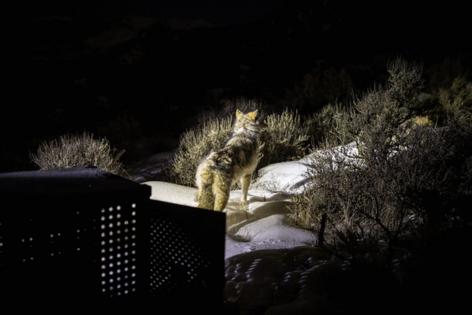Colorado lawmakers push for pause on wolf reintroduction in new bill for special session
Published in News & Features
DENVER — Colorado lawmakers will consider pausing the state’s wolf reintroduction program for a year to reduce spending amid a massive budget deficit.
A bipartisan bill, made public Tuesday, would reallocate $254,000 that’s set aside for transporting more wolves to Colorado this winter and instead use it to help pay for a state program to lower health insurance costs. The bill will be heard during a special legislative session that starts Thursday to address the $783 million state general fund budget deficit caused by the federal tax bill.
The bill has broad sponsorship, extending from the Western Slope to the Front Range. But it was unclear if it would gain traction with lawmakers more broadly during the short session.
Under the bill, state funding for other aspects of the wolf program — like staffing, conflict minimization and compensation of ranchers for impacts to livestock — would remain in place. If implemented, the budget for the wolf program during this fiscal year, which runs through next June, would shrink from $2.1 million to $1.8 million.
CPW would not be permitted to use any of the remaining money for a new reintroduction round.
“I think the state would make a better investment in people’s health insurance right now, (rather) than spending money on more wolves,” said Sen. Dylan Roberts, a Dillon Democrat who is sponsoring the bill.
Colorado Parks and Wildlife has released two batches of wolves captured elsewhere into the state so far: 10 from Oregon in December 2023 and 15 from British Columbia in January. Those wolves have since reproduced and established four packs across the state.
CPW has not released final counts for the number of pups born this summer, but at least 30 wolves roam Colorado.
A slim majority of Coloradans voted in 2020 to reintroduce the canines to the state, with many urban voters casting their ballots in favor of the effort and rural voters opposing it. Gray wolves are a native species to Colorado but were eradicated from the state through hunting and poisoning.
State staff during the 2020 ballot campaign estimated the wolf program would cost about $800,000 a year, but it has been much more expensive than expected. The program cost $3.5 million in the 2024-25 fiscal year, including hundreds of thousands of dollars paid to ranchers to compensate for livestock killed by wolves and other indirect impacts to livestock from wolves’ presence.
Many of the state’s ranching groups have opposed the reintroduction of the wolves, which have killed and injured 46 head of livestock and one working dog since April 2024. But previous efforts to halt or pause the reintroduction effort have failed.
A pause on bringing more wolves to Colorado would give CPW more time to improve its conflict-minimization programs, Roberts said. A pause would not violate the language of Proposition 114, he said, since it required the state to reintroduce the species by the end of 2023 but did not set further timelines for how the program would unfold.
“This is a reasonable one-year pause that I think will make the program better in the long run,” he said.
Wolf advocates slammed the bill and said it would reverse progress made by CPW to implement the will of voters.
The bill is a “flimsy pretext” to use the budget crisis to implement Roberts’ and other lawmakers’ longstanding goal to pause the wolf program, said Michael Saul, the director of the Rockies and Plains program for Defenders of Wildlife.
“We’ve seen Roberts’ determined opposition to any wolves in Colorado for years,” he said. “It’s disingenuous to say this is anything but an attempt to set the population back to zero.”
The bill comes as CPW continues its attempts to kill at least two more wolves connected to livestock killings. More wolves are needed to make up for those killings and continued deaths among the population.
“If we stop now — before we have enough starter wolves (and) while we’re killing wolves — we’re not just pausing the program, we’re essentially setting it back to square one,” Saul said.
_____
©2025 MediaNews Group, Inc. Visit at denverpost.com. Distributed by Tribune Content Agency, LLC.







Comments